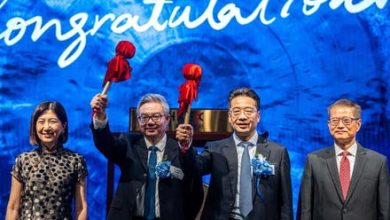Can Comcast Stock Recover To $60?

- Share to Facebook
- Share to Twitter
- Share to Linkedin
GARHAM, GERMANY – 2022/03/25: In this photo illustration, the Comcast Cable (Xfinity) logo is … [+]
SOPA Images/LightRocket via Getty Images
Comcast stock (NASDAQ: CMCSA), one of the largest cable TV and internet players in the U.S, currently trades at $39 per share, about 32% below the peak of $61.75 seen in September 2022, and appears to have room for some gains. Comcast has been weighed down by a couple of factors, including slowing growth of the broadband market following a surge seen through Covid-19, and continued subscriber losses in cable TV operations. Comcast’s broadband business is also being hurt by higher competition from wireless carriers, who have been leveraging their newly built 5G networks to offer fixed-wireless broadband services. Moreover, a slowdown in housing transactions amid high interest rates has resulted in a decline in new home broadband connections. Over Q2 2024, the most recently reported quarter, the company lost 120,000 total domestic broadband customers, although the revenue impact was partly offset by a higher average per customer revenues. However, the stock has gained 41% from a low of about $28 on September 30, 2022, driven in part by Comcast’s traction in the wireless phone space, as well as the strong recovery of the theme park business following Covid-19.
Looking at a slightly longer period, CMCSA stock has seen a decline of 20% from levels of $50 in early January 2021 to around $40 now, vs. an increase of about 40% for the S&P 500 over this roughly 3-year period. However, the decrease in CMCSA stock has been far from consistent. Returns for the stock were -2% in 2021, -29% in 2022, and 29% in 2023. In comparison, returns for the S&P 500 have been 27% in 2021, -19% in 2022, and 24% in 2023 – indicating that CMCSA underperformed the S&P in 2021 and 2022. In fact, consistently beating the S&P 500 – in good times and bad – has been difficult over recent years for individual stocks; for heavyweights in the Communication Services sector including GOOG, META, and NFLX, and even for the mega-cap stars TSLA, MSFT, and AMZN.
In contrast, the Trefis High Quality Portfolio, with a collection of 30 stocks, has outperformed the S&P 500 each year over the same period. Why is that? As a group, HQ Portfolio stocks provided better returns with less risk versus the benchmark index; less of a roller-coaster ride as evident in HQ Portfolio performance metrics. Given the current uncertain macroeconomic environment with high oil prices and elevated interest rates, could CMCSA face a similar situation as it did in 2021 and 2022 and underperform the S&P over the next 12 months – or will it see a recovery?
Returning to the pre-inflation shock level means that CMCSA stock will have to gain about 60% from here. However, we do not believe that will materialize anytime soon and estimate Comcast’s valuation to be around $45 per share, roughly 15% ahead of the current market price. While Comcast’s broadband and TV business faces headwinds, the company’s parks business is also cooling off. Over Q2 2024, the company said that revenue from theme parks declined nearly 11% to $1.98 billion. Although this can be attributed in part to a lack of new attractions in Universal’s theme parks, the broader slowdown in post-Covid travel is also a factor. Our detailed analysis of Comcast upside post-inflation shock captures trends in the company’s stock during the turbulent market conditions seen over 2022. It compares these trends to the stock’s performance during the 2008 recession.
2022 Inflation Shock
Timeline of Inflation Shock So Far:
Best Tax Software Of 2022
Best Tax Software For The Self-Employed Of 2022
Income Tax Calculator: Estimate Your Taxes
- 2020 – early 2021: Increase in money supply to cushion the impact of lockdowns led to a high demand for goods; producers were unable to match up.
- Early 2021: Shipping snarls and worker shortages from the coronavirus pandemic continue to hurt the supply
- April 2021: Inflation rates cross 4% and increase rapidly
- Early 2022: Energy and food prices spike due to the Russian invasion of Ukraine. Fed begins its rate hike process
- June 2022: Inflation levels peak at 9% – the highest level in 40 years. The S&P 500 index declined more than 20% from peak levels.
- July – September 2022: Fed hikes interest rates aggressively – resulting in an initial recovery in the S&P 500 followed by another sharp decline.
- October 2022 – July 2023: Fed continues rate hike process; improving market sentiments helps S&P500 recoup some of its losses.
- Since August 2023: the Fed has kept interest rates unchanged to quell fears of a recession and there is a possibility of rate cuts this year.
In contrast, here’s how CMCSA stock and the broader market performed during the 2007/2008 crisis.
Timeline of 2007-08 Crisis
function loadConnatixScript(document) {
if (!window.cnxel) {
window.cnxel = {};
window.cnxel.cmd = [];
var iframe = document.createElement(‘iframe’);
iframe.style.display = ‘none’;
iframe.onload = function() {
var iframeDoc = iframe.contentWindow.document;
var script = iframeDoc.createElement(‘script’);
script.src = ‘//cd.elements.video/player.js’ + ‘?cid=’ + ’62cec241-7d09-4462-afc2-f72f8d8ef40a’;
script.setAttribute(‘defer’, ‘1’);
script.setAttribute(‘type’, ‘text/javascript’);
iframeDoc.body.appendChild(script);
};
document.head.appendChild(iframe);
const preloadResourcesEndpoint = ‘https://cds.elements.video/a/preload-resources-ovp.json’;
fetch(preloadResourcesEndpoint, { priority: ‘low’ })
.then(response => {
if (!response.ok) {
throw new Error(‘Network response was not ok’, preloadResourcesEndpoint);
}
return response.json();
})
.then(data => {
const cssUrl = data.css;
const cssUrlLink = document.createElement(‘link’);
cssUrlLink.rel = ‘stylesheet’;
cssUrlLink.href = cssUrl;
cssUrlLink.as = ‘style’;
cssUrlLink.media = ‘print’;
cssUrlLink.onload = function() {
this.media = ‘all’;
};
document.head.appendChild(cssUrlLink);
const hls = data.hls;
const hlsScript = document.createElement(‘script’);
hlsScript.src = hls;
hlsScript.setAttribute(‘defer’, ‘1’);
hlsScript.setAttribute(‘type’, ‘text/javascript’);
document.head.appendChild(hlsScript);
}).catch(error => {
console.error(‘There was a problem with the fetch operation:’, error);
});
}
}
loadConnatixScript(document);
- 10/1/2007: Approximate pre-crisis peak in S&P 500 index
- 9/1/2008 – 10/1/2008: Accelerated market decline corresponding to Lehman bankruptcy filing (9/15/08)
- 3/1/2009: Approximate bottoming out of S&P 500 index
- 12/31/2009: Initial recovery to levels before accelerated decline (around 9/1/2008)
CMCSA and S&P 500 Performance During 2007-08 Crisis
CMCSA stock declined from nearly $24 in September 2007 (pre-crisis peak) to $13 in March 2009 (as the markets bottomed out), implying CMCSA stock lost almost 50% of its pre-crisis value. It recovered from the 2008 crisis to levels of around $17 in early 2010, rising 29% between March 2009 and January 2010. The S&P 500 Index saw a decline of 51%, falling from levels of 1,540 in September 2007 to 757 in March 2009. It then rallied 48% between March 2009 and January 2010 to reach levels of 1,124.
CMCSA Fundamentals Over Recent Years
Comcast’s revenues rose from $109 billion in 2019 to $121.4 billion in 2022, as higher broadband net adds through the pandemic helped the company offset some of the other disruptions to the business, such as the impact of theme park closures. In 2023, revenues came in at $121.572 billion. Comcast’s earnings rose from around $2.87 per share in 2019 to $3.71 in 2023.
Does CMCSA Have A Sufficient Cash Cushion To Meet Its Obligations Through The Ongoing Inflation Shock?
CMCSA’s total debt declined from $102 billion in 2019 to $97.1 billion in 2023, while its total cash stood at about $10 billion. The company reported operating cash flows of about $26 billion in 2019 and the metric has grown to $28.5 billion in 2023. Although Comcast’s net debt levels are elevated, its relatively stable cash flows from the cable and broadband business reduce the financial risk for the stock.
Conclusion
With the Fed indicating that it would hold off on interest rate hikes while planning multiple rate cuts for 2024, we believe Comcast’s stock has the potential for some gains.
CMCSA Return Compared with Trefis Reinforced Value Portfolio
Trefis
Invest with Trefis Market Beating Portfolios
See all Trefis Price Estimates



